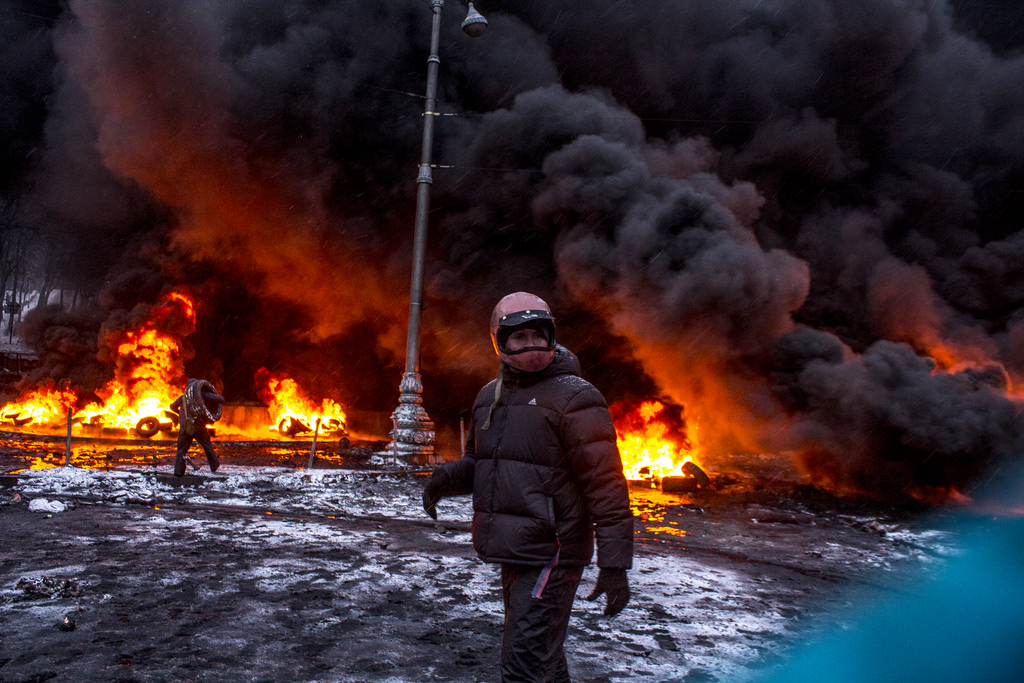By Valerie Franklin (Contributor) – Email
Print Edition: February 5, 2014

What would it take to make 200,000 Canadians walk into the streets and protest? Budweiser shutting down its production line? Another humiliating hockey defeat? How about losing our legal right to protest, like in Ukraine?
To recap: since mid-January, Ukrainian citizens have taken to the streets against their government’s draconian new anti-protesting laws. These so-called “dictatorship laws” outlaw motorcades and mask-wearing, legalize trial in absentia and internet censorship, and slap six-year prison sentences on protesters who block access to residential buildings or engage in “extremist activity” — a chillingly vague term.
As if that’s not enough, a cease-and-desist message from the government appeared on mobile phones across central Kiev when the riots began, seemingly straight out of Orwell’s 1984: “Dear subscriber, you are registered as a participant in a mass disturbance.”
In response to their government’s actions, Ukrainians took to the streets en masse and started burning Kiev down.
The photos are terrifying: smoky rubble-strewn streets, bloodied photographers, rioters whipping armoured police officers with chains. The sheer scope of the protests, combined with intense pressure and criticism from the international community, forced the government to backpedal. The anti-protesting laws were repealed, Prime Minister Mykola Azarov resigned in shame, and amnesty was offered to the arrested protesters on the condition that the other protesters clear the area. For once, things started looking up for the little guys — but you’d better believe they suffered and bled for it.
But what if this had happened in Canada?
Would we have reacted with that kind of visceral, teeth-kicking survival instinct if the Harper government had tried to outlaw protesting? Or would the stereotype of the genial, unexcitable, beer-swilling Canadian turn out to be closer to the truth than we’d like?
We should be keeping a closer eye on the state of our own freedom of speech and knowledge, especially as university students who have an active interest in the role of the arts and the sciences in society. In the last few years we’ve watched the Canadian government muzzling scientific research, invading the privacy of our personal communications, crawling into bed with enormous corporations, and trying to restrict our access to the internet. We talk a lot about how much we dislike our politicians on both a personal and an ideological level, but we don’t do anything about it. We post a Facebook status and forget about it.
To be clear, I’m not condoning the kind of violence that Ukraine has seen in the past few weeks. To date, four protesters have been killed in the riots, others are missing, many others have been badly injured, and untold damage has been done to innocent people’s vehicles, homes, and businesses. But we’re not talking about rioting, which is violent and destructive — we’re talking about protesting. Too often the two are confused or deliberately blurred together.
At what point do we decide that enough is enough? Would it take a Canadian set of “dictatorship laws” for us to show the same passion for free speech, knowledge, and information? There’s a time to stop talking and start marching. When writing articles and reposting social media campaigns don’t work, we always have the option to physically occupy a space. We can fill the streets, stop traffic, make noise. We can use our bodies to tell the world, “I am here.” Nothing should be able to invalidate our right to make that basic statement.
What should we be learning from the way the Ukrainian protesters have refused to accept oppression?
That it works.


